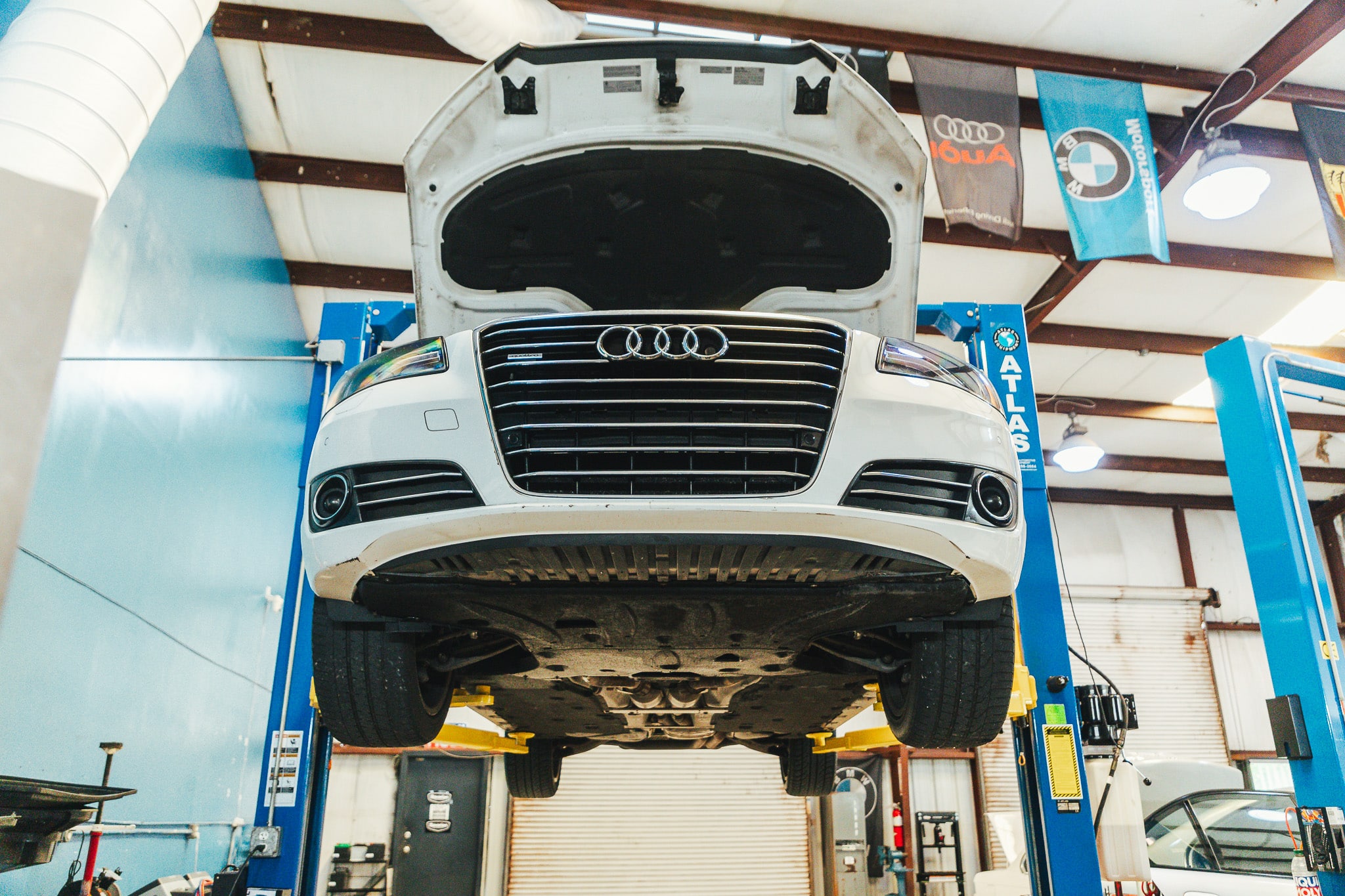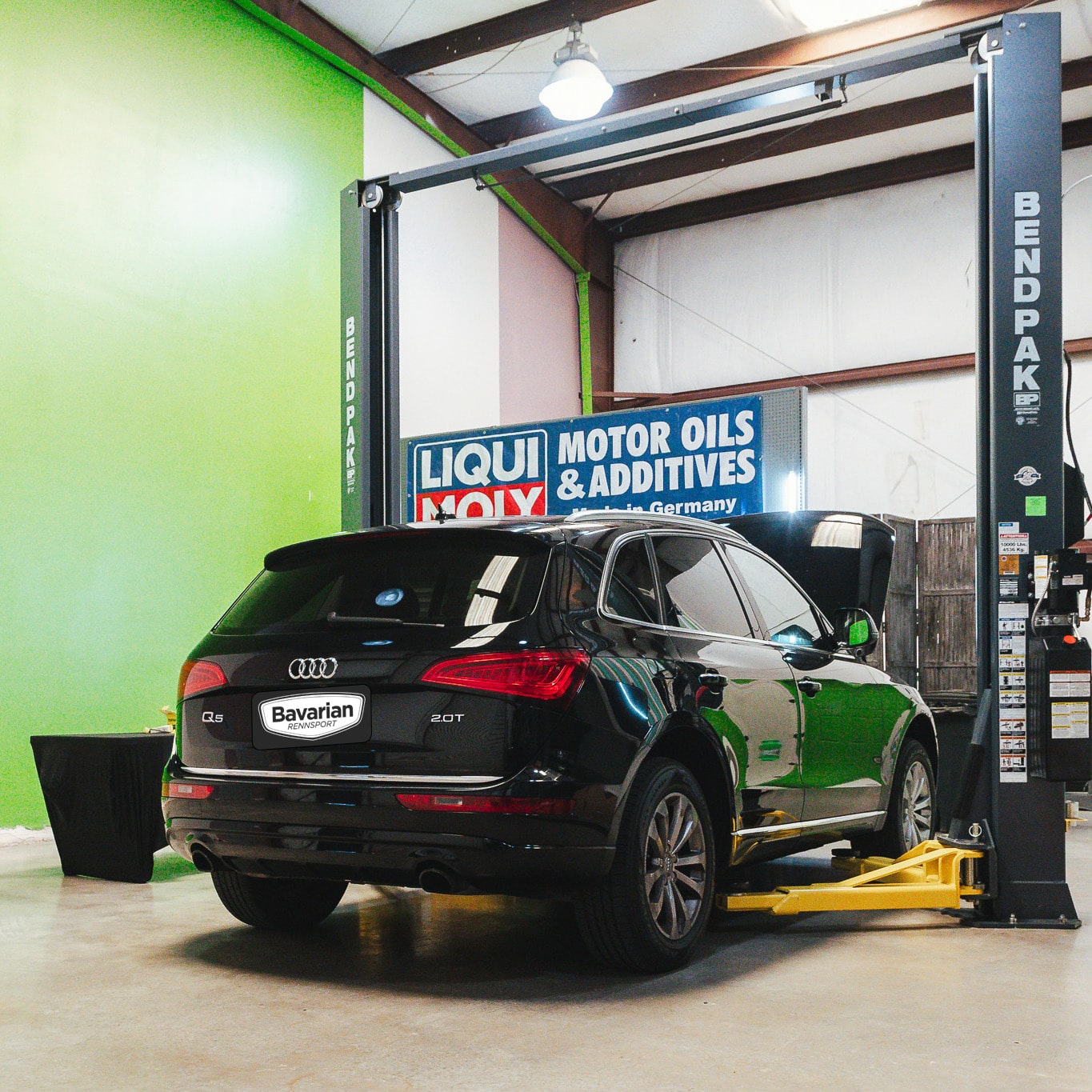Audi Repairs Include 2 Year Nationwide Warranty On Parts and Labor
Check engine light on? Engine running rough? Here you will find answers to the most frequently diagnosed Audi problems brought into Bavarian Rennsport. We do not recommend you assume that the answer here directly relates to your car. Accurate diagnosis of a problem typically saves you money. Often third parties will misdiagnose a car for what appears to be similar problems or related diagnostic codes.
If you start to notice excessive oil consumption or blue-smoke at idle on your Audi, get an early diagnosis. Many shops misattribute it to a head gasket or turbo seal and replace only the turbo’s oil pressure seal, yet smoke persists. The true culprit is the plastic oil separator/PCV valve assembly beneath the intake manifold, which cracks or clogs with sludge and dumps oil mist into the intake tract. Symptoms include rough idle, extended cranking, oil-soaked spark plugs and diagnostic codes like P0171, P0300 or PCV-system faults.

Extraction requires removal of the engine cover, intake manifold and turbo inlet pipe, turning what seems like a simple part swap into a 4-6 hour job under dealer labor rates. Dealers often quote exorbitant prices for parts and labor and may even recommend turbo or manifold removal, driving costs to thousands of dollars. Left unaddressed, PCV failure leads to fouled intake runners, carbon buildup on valves and premature turbo bearing wear. A catch-can offers only a stopgap. It won’t cure cracks or restore internal valve function. We offer a direct, efficient and cost-effective approaches to these issues. Bavarian Rennsport’s installation carries a 2-year nationwide warranty on parts and labor. We offer dealer-level assurance at a fraction of the cost.
View Bavarian Rennsport’s Audi Service And Repair Options
Oil Separator / PCV Valve
On Audi’s EA888‐equipped models (A3 8P, A4 B8, A5 B8, Q5 8R), the plastic oil separator and PCV valve crack or clog with sludge, causing vacuum leaks, rough idle and excessive oil consumption. Failure allows crankcase vapors and oil mist into the intake tract, fouling spark plugs and turbo inlets.
Water Pump Failure
Many transverse 2.0 TFSI (A3, A4 B8, Q5 8R) and longitudinal 3.0 TFSI (Q7 4L) engines employ plastic‐impeller water pumps that seize or leak, leading to coolant loss and overheating. Secondary (auxiliary) electric water pumps under the dashboard can also fail, producing fluctuating cabin heat and buzzing noises.
Water Intrusion
A4 B8, A6 C6 and Q5 8R owners report water pooling in footwells and trunks from clogged scuttle drains, door‐seal leaks and sunroof frame overflow. Left untreated, moisture corrodes electrical modules and carpets, often requiring carpet removal and module replacement.
Sunroof Drains – Rear
Panoramic-roof Q3 (2019+), Q5 and e-tron models suffer blocked rear drain hoses that disconnect or kink, allowing water into the cargo area and soaking the BCM. Dealers often replace modules under extended warranty after costly water damage. Click here to see other common problems with the Audi Q5

Timing Chain Tensioner Failure
Early EA888 Gen 1 2.0 TFSI engines in A3 8P (2008–2012), A4 B8 (2009–2013), A5 B8 and TT 8J developed plastic-guide and spring failures in the upper cam tensioner, causing cold-start rattles and potential chain skip. When tension is lost, the chain can jump teeth, risking valve‐piston contact and catastrophic engine damage.

Coolant Pump Failure (Thermostat Housing)
EA888 Gen 3 engines integrate the coolant pump into the plastic thermostat housing; cracks or gasket failure here lead to slow coolant loss, overheating and hairline leaks that are invisible until serious damage occurs. Replacement requires manifold removal and often full housing kit installation.
Engine Misfires
Direct‐injection models (A4 B8, A6 C6, Q5 8R) accumulate intake‐valve carbon, causing cold-start and load-induced misfires (DTCs P0300–P0304) and rough idle. Effective repair is walnut‐blasting or manual cleaning of valves plus ignition coil and spark plug replacement.
Blocked Plenum Tray Drains
Leaves and debris clog the scuttle/plenum tray beneath the windshield on A4 B8 and A5 B8, blocking drains into the fender wells; heavy rain then floods the blower housing and interior. Simple vacuuming and compressed‐air flushing every 6 months prevents this costly moisture intrusion.
Ignition Coil Failures
Heat-soak and oil leaks crack coil boots on 2.0 TFSI (A3 8P, A4 B8, TT 8J) and 3.2 V6 engines, triggering cylinder-specific misfires (codes P0301–P0304), rough running and reduced power. Swapping coils to confirm failure and replacing all four at once is recommended for long-term reliability.


